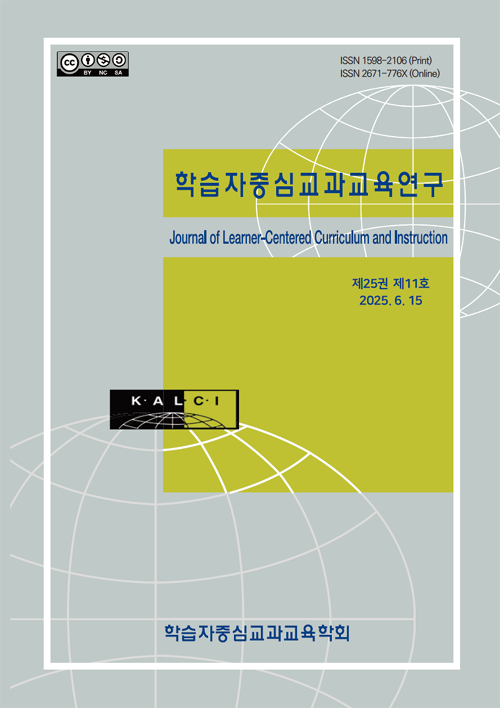- 영문명
- Influence of critical thinking disposition, consciousness of biomedical ethics, and nursing professionalism on attitude toward withdrawal of life-sustaining treatment of nursing students
- 발행기관
- 학습자중심교과교육학회
- 저자명
- 장순양(Soon Yang Jang) 김영아(Yeong Ah Kim)
- 간행물 정보
- 『학습자중심교과교육연구』제25권 11호, 113~125쪽, 전체 13쪽
- 주제분류
- 사회과학 > 교육학
- 파일형태
- 발행일자
- 2025.06.15

국문 초록
목적 본 연구는 간호대학생의 비판적 사고성향, 생명의료윤리의식 및 간호전문직관이 연명치료중단태도에 미치는 영향을 확인하기 위하여 시도되었다.
방법 D시 소재 대학에 재학 중인 간호대학생 232명을 대상으로 구조화된 설문지를 활용하여 자료수집하였다. 수집된 자료는 SPSS 23.0프로그램을 이용하여 서술적 통계, independent t-test, one-way ANOVA, Pearson’s correlations, Hierarchical multiple regression으로 분석하였다.
결과 대상자의 연명치료중단태도는 생명윤리 관련 교과목 이수 경험(t=-2.435, p=.016), 가족 또는 의미있는 사람의 죽음 경험(t=2.053, p=.041), 연명치료중단태도에 대한 자신의 태도(F=8.177, p<.001) 및 연명치료중단에 대한 결정권자(F=9.959, p<.001)에 따라 차이가 있었다. 대상자의 비판적 사고성향은 3.58±.37점, 생명의료윤리의식은 2.80±.20점, 간호전문직관은 3.64±.48점, 연명치료중단태도는 3.36±.43점이었다. 연명치료중단태도는 비판적사고성향(r=.199, p=.001), 간호전문직관(r=.159, p=.008)과 양의 상관이 생명의료윤리의식(r=-.185, p=.002)과는 음의 상관이 있었다. 생명의료윤리의식(β=-.236), 비판적 사고성향(β=.171), 간호전문직관(β=.171)이 연명치료중단태도에 영향을 미치는 요인으로 설명력은 24.7%였다(F=9.404, p<.001).
결론 본 연구 결과를 통해 연명치료중단에 대한 올바른 태도를 형성할 수 있는 교육 프로그램의 개발과 다양한 변인을 포함한 반복 연구를 제언한다.
영문 초록
Objectives The purpose of this study was to identify the effects of undergraduate nursing students’ critical thinking disposition, consciousness of biomedical ethics, and nursing professionalism on attitudes toward withdrawal of life-sustaining treatment.
Methods The subjects were 232 undergraduate nursing students in this study. The structured questionnaires were utilized. Data were analyzed using descriptive statistics, independent t-test, one-way ANOVA, Pearson’s correlation coefficient, and Hierarchical multiple regression using SPSS 23.0 program.
Results In attitudes toward withdrawal of life-sustaining treatment(WLST), there were significant differences in educational experience related to biomedical ehtics(t=-2.435, p=.016), experience the death of a family member or someone significant(t=2.053, p=.041), how firm is the attitude toward WLST(F=8.177, p<.001), and who has the authority to decide whether to WLST(F=9.959, p<.001). The subjects’ critical thinking disposition is 3.58 points, consciousness of biomedical ethics is 2.80 points, nursing professionalism is 3.64 points, and attitudes toward withdrawal of life-sustaining treatment is 3.36 points. Attitudes toward withdrawal of life-sustaining treatment had a significant correlation with critical thinking disposition(r=.199, p=.001), nursing professionalism(r=.159, p=.008), and consciousness of biomedical ethics(r=-.185, p=.002). The factor that affected attitudes toward withdrawal of life-sustaining treatment were consciousness of biomedical ethics(β=-.236), critical thinking disposition(β=.171), nursing professionalism(β=.171). The regression model explained 24.7% of the effect on attitudes toward withdrawal of life-sustaining treatment(F=9.404, p<.001).
Conclusions Based on the results, it is necessary to develop an educational program for undergraduate nursing students. We suggest that further research is needed to verify the qualitative interaction between undergraduate nursing students’ attitudes toward withdrawal of life-sustaining treatment and biomedical ethics.
목차
Ⅰ. 서론
Ⅱ. 연구 방법
Ⅲ. 연구 결과
Ⅳ. 논의 및 제언
참고문헌
키워드
해당간행물 수록 논문
참고문헌
최근 이용한 논문
교보eBook 첫 방문을 환영 합니다!

신규가입 혜택 지급이 완료 되었습니다.
바로 사용 가능한 교보e캐시 1,000원 (유효기간 7일)
지금 바로 교보eBook의 다양한 콘텐츠를 이용해 보세요!


